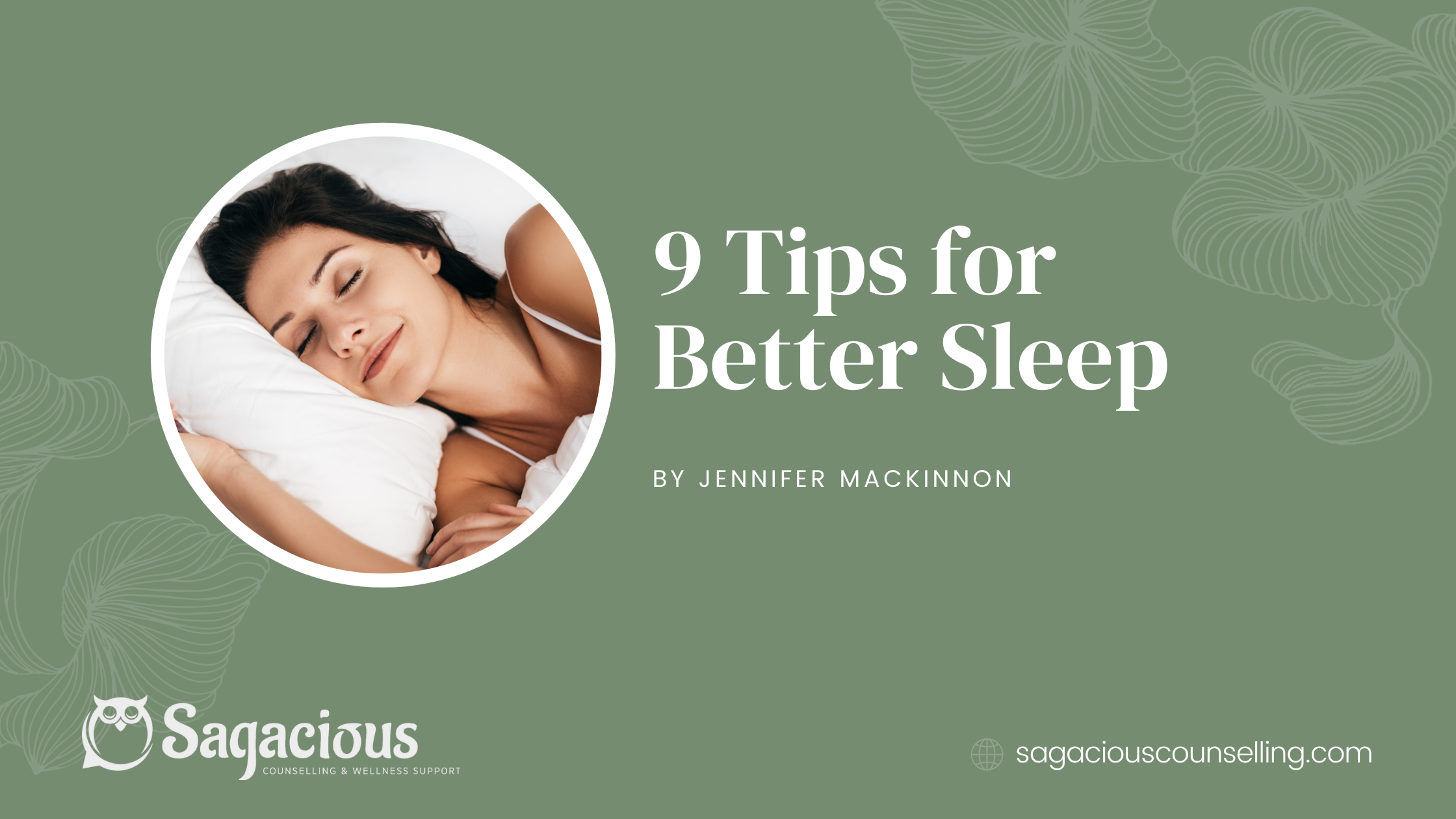On average, people sleep 1/3 of their life. It is essential to balance sleep and wake time as too much or too little can be hard on your brain and body functioning. Sleep is a cause and a symptom of mental health concerns.
When we get too much sleep, we often feel weak, tired, lazy and sometimes depressed. If we have all of these symptoms, it causes us to want to sleep more.
However, when we don’t get enough sleep, our bodies and minds don’t have time to heal, repair and process the things going on in our lives which can cause anxiety and a lack of coping skills.
When discussing mental health concerns, we often look at patterns that contribute to lack of or excessive sleep. To improve mental health, we need to look at sleep as a necessary contributing factor. Thus we usually need to find ways to improve sleep. Here are 9 things you can do to start improving your sleep right now.
9 Tips for Better Sleep
1. Go outside for fresh air
Our body keeps track of our sleep and wakes times by way of the circadian rhythm. This internal clock listens to our brain, hormones and body to know when to rise and when to rest. Being in natural light and fresh air helps your body wake up and stay up. When outside, we are more likely to be active. Later having been in the fresh air will help our body feel tired when it is time to sleep.
2. Reduce blue light in the evening
Blue light also affects the circadian rhythm. Blue lights come from TVs, smartphones, laptops and gaming mechanisms. Blue light tricks the mind, body and hormones into thinking it is still daytime. Avoiding blue light 1 hour before bed is effective at helping people wind down before falling asleep.
3. Be mindful of what you drink before bed
Caffeine – can cause wakefulness in many people; it enhances energy, sports performance and keeps you awake. Try to reduce caffeine up to 6 hours before bed. (Caffeine sources include coffee, tea, cola, and pre-workout supplements).
Alcohol – Alcohol stimulates the liver and kidneys to go into overdrive to process alcohol. As a result, people can feel withdrawal symptoms within a couple of hours, including wakefulness, anxiety, sweating, rapid heart rate, temperature fluctuating, and headache. (Alcohol sources include beer, wine, coffee liquor, hard alcohol and coolers).
Water/Juice – yes, too much water can keep you up heading to the bathroom for a pee break in the night, causing broken sleep.
4. Sleep and wake routine are critical
Remember when you were young and could stay up all night, go to work or sleep for two days, and still go to bed at night? Your body was thriving in the chaos, well, not anymore. As an adult, our body and brain crave the structure of sleep and wake routines. This is especially important if you struggle with inconsistent sleep. By going to bed at the same time at night and waking at the same time every day, your body, brain and circadian rhythm will adjust. The hard part is waking up in the morning after a poor sleep. If you wake up and do the previously mentioned things throughout the day, you should be ready for bed at bedtime.
5. Reduce Naps
Sleeping during the day affects that pesky internal clock (circadian rhythm). While a 30-minute nap can benefit the body and brain, longer naps can affect nighttime sleep. When people are overwhelmed, anxious or worn out, a small power nap can be enough to restart normal functioning. It is kind of like restarting your computer when it isn’t working correctly. On the other hand, long naps tend to make us feel lazy and log hours to our sleep log for the day, thus telling our mind and body we are not tired later. Try to stop napping in the day or having very short naps to improve sleep hygiene.
6. Create a bedroom oasis
To create a cozy bedroom, you want to address things like light, noise, mess and comfort. One simple things to do is make your bed when you wake up. When you pull back the bedding, it symbolizes that you are getting into bed which signals the brain for sleep. Having a room that is free of clutter is helpful to creating a bedroom oasis. Buy a comfy pillow or blanket that makes you feel relaxed. When possible, replace your mattress if you are waking up stiff and sore.
Noise – there are two types of people; the ones who need noise to sleep and the other who can’t have any sound. So first, explore the sounds in your room, turn the TV or radio off. Then, turn on a fan or an app with white noise, which is proven to cover up small house noises allowing the light sleeper a more deep sleep.
Light – as previously discussed, turn off technology before bed. The light is distracting to sleep. Leave a warm hall light on or nightlight if needed, but dark is the most effective for deep sleep.
Temperature – like goldilocks, you never want to be too hot or too cold; you want to be just right. Adding a fan to your room will allow air to circulate and distribute sound. Opening a window to allow cool air in helps foster deeper sleep. Picking blankets that don’t make you sweat are critical.
Use the bed only for sleep and intimacy. Laying in bed watching TV confuses the brain, so it doesn’t know if bed means sleep time or TV time.
7. Relax your mind before bed
Having a before-bed self-care routine is beneficial to slowing the brain down and telling the body it’s bedtime. Relaxation techniques can include reading, taking a bath, deep breathing, visualization, strategic muscle tensing, meditating, stretching, massage or journaling. Even something as simple as symbolically putting on PJs, washing your face and brushing your teeth is a bedtime routine. Try different things to see what is best for you.
8. Get Exercise
Exercise has multiple health benefits, and it also helps sleep. Getting at least 20 minutes of exercise a day helps insomnia. Along with fresh air moving the body is an excellent way to feel tired at the end of the day. Exercise can be anything from walking, running, doing a routine, joining a fitness class, swimming, moving furniture, playing hide and seek, cycling, doing yard work or playing sports.
9. Rule out medical reasons for sleep disturbances
There are many medical reasons people lose sleep, such as pregnancy, sleep apnea, mesopause, thyroid, and many others. Seek assistance in learning medical reasons as to why sleep hygiene doesn’t work for you.
The Bottom Line
Good sleep hygiene or good sleep routines help reduce the adverse effects of mental health concerns such as depression, anxiety and addiction triggers. When rested, we are stronger mentally, physically and psychologically. We are more capable, easier to get along with, and better at coping with life stressors. When we can get good quality sleep, we tend to be less emotional and more logical in decision making. Sleep allows our whole mind, body and spirit to heal from life. By implementing a few of these tips into your life, you could improve your sleep.



